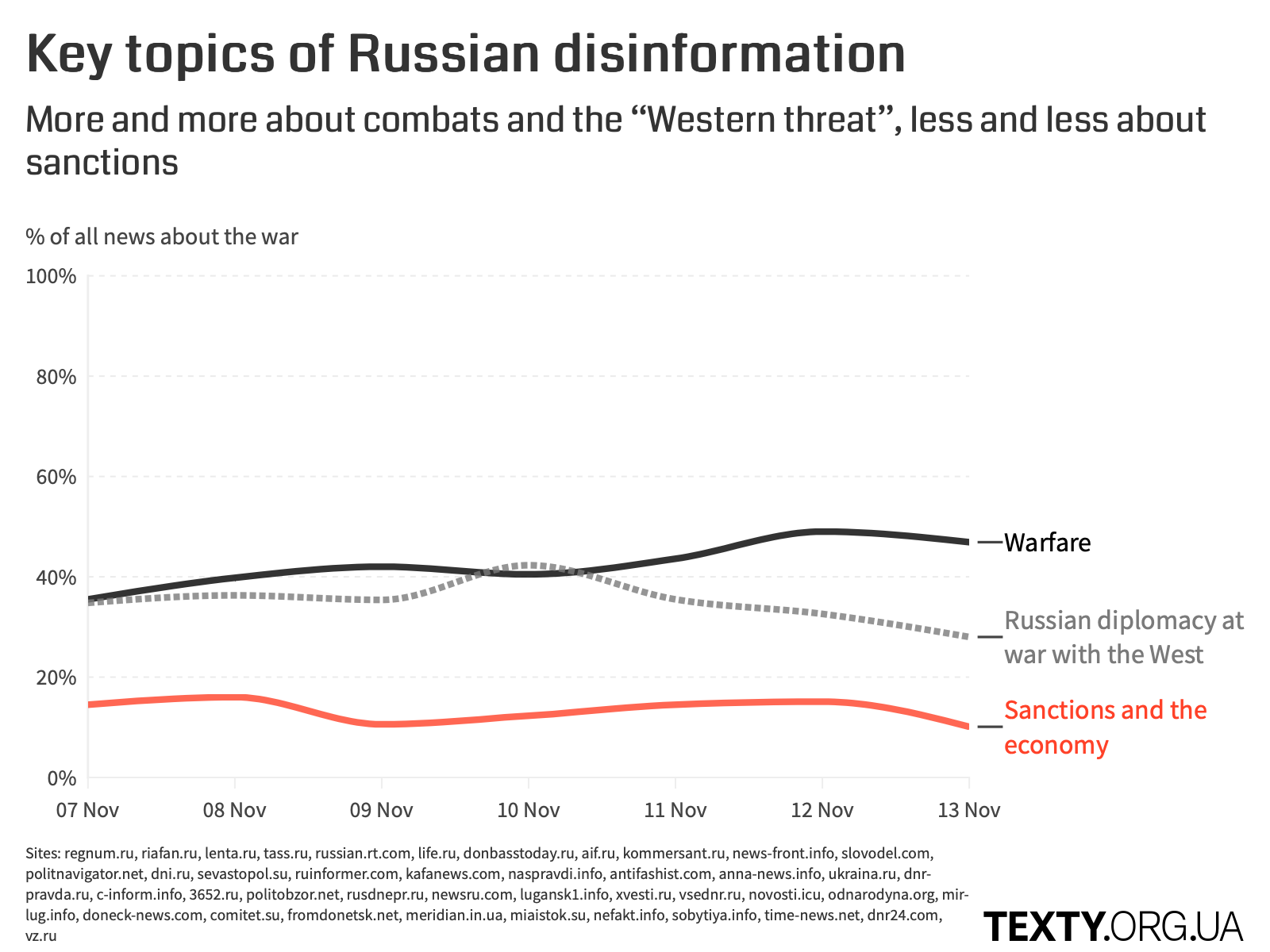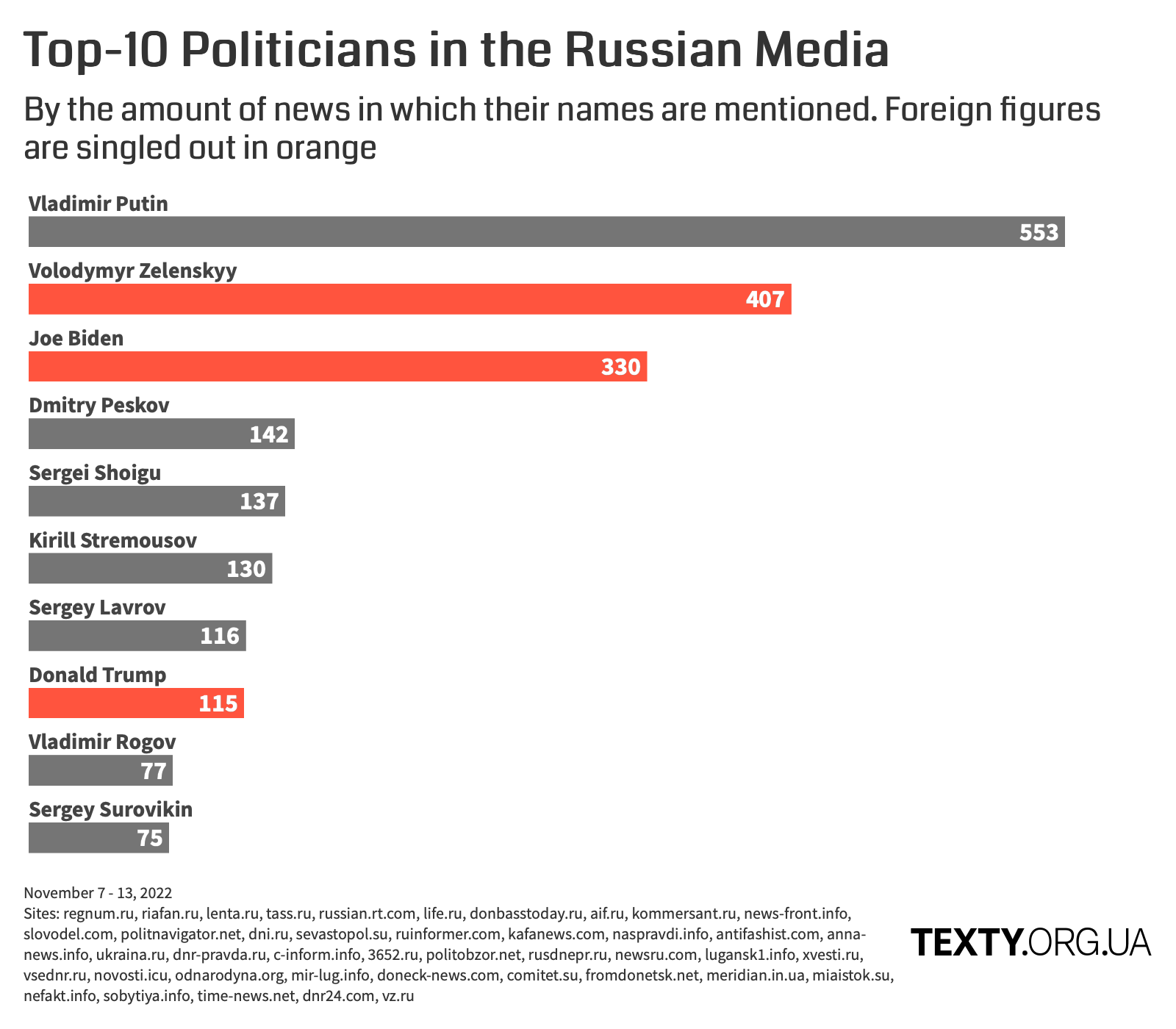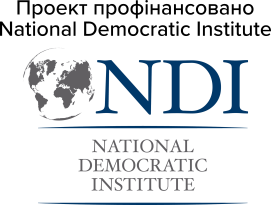Polish Mercenaries Liberate Kherson After a Backdoor Deal. Russian Media Monitoring Report, 7-14 November 2022
The liberation of the western bank of Kherson oblast was in the focus of last week's publications on Russian media for obvious reasons. Russian commentators made no particular attempt to conceal their sadness and desperately insisted on the existence of some dirty deals. While trying to exonerate their military command for the failures in the battlefield, they came up with wild stories about Polish mercenaries who were allegedly the tip of the spear of the Ukrainian offensive.
All those efforts point at the fact that they just cannot admit a humiliating military defeat from the “khokhols” they used to mock for decades. This monitoring report covers these and other topics of the disinformation spread by Russian state media and online parajournalists to manipulate public opinion.

Kherson Backdoor Deal
Last week, the twisted world being so painstakingly created by Russian propagandist media had another harsh collision with reality. Ukrainian army forced the Russians to retreat from the western part of Kherson oblast on the right bank of the Dnieper. Most of the so-called Russian military correspondents with an ultra-right stand could not contain their emotions or hide their bitter disappointment. Many threw angry accusations of “backdoor deals” and demanded calling the “civil administration” to answer. This pathetic euphemism was obviously aimed at Putin’s policy, but the “military correspondents” still do not dare criticize their leader openly.
That being said, the most prominent Russian wannabe analysts tried to spin the defeat and pretend it to be a victory: “The withdrawal was in fact part of a bigger plan to stage new strikes within the coming months and trap the enemy in a freezing city. Our artillery and UAVs will continue to target the enemy”, “Russia is launching a systemic military operation. We shall redouble our efforts to cripple the enemy’s military infrastructure. Its military logistical chains will soon collapse. We shall turn the tide of war in Kherson and keep pushing until a complete victory!”
Strangely enough, general Surovkin also managed to escape any and all criticism for the Kherson debacle. On the contrary, he was praised for having been able to save ‘the priceless lives of our soldiers”. The Prigozhyn-Kadurov duo was especially prolific in flattery. The two called the ill-fated Russian general “a man who doesn’t shy away from responsibility” while his decisions were called “difficult, but right”.
By and large, Russian “military correspondents” were rather pessimistic. They brooded about the future vectors of Ukrainian counter-offensive and discussed the strength of the defenses of the occupied Crimea. The Zaporizhzhia area raised the biggest concerns since the occupiers are worried about losing the Melitopol railway hub and, consequently, their land connection with Crimea: “AFU have been amassing a large group of troops in Zapozhye area which hints at Kyiv's intention to sever the land bridge to Crimea”. These fears were not unfounded as the delusional reports published on Russian propagandist media warned about “over five thousand Polish mercenaries” and detachments of “Arab mercenaries from "Djebhad al-Nusra” and Daesh”.
To find out more about the prospects of Russian offensive in the east and the reasons behind Russian army's stalemate read here.
Tabloids vs Zelenskyy
Building the “expert pool” of social media users (which are usually impersonated by Russian bots) has long become a standalone genre of Russia propaganda and disinformation. Even a single comment can help the propagandists twist any discussion and steer it in any direction they want to make Russia look good.
It was this kind of propaganda that dominated Russian media last week. Thematic sets of commentaries covered all the major events: from Ukraine's statements regarding the participation of President Zelenskyy in the G20 summit to the U.S. election.
“Social media users” praised the political genius of Putin behind his wise decisions — for example, not to go to Bali:
“Right now this is outright dangerous. As they say, better safe than sorry”, says Aleksey N.”,
“It would be wrong to seek ideological motives behind the policy pursued by Russian president Vladimir Putin, thinks Ash-Shaer. In his opinion, it is history that defines a truly great leader”.
To add a bit of diversity, they blamed the USA for being an evil state of biblical scale and sparking wars all over the world: “The user who left the last comment reminded that the USA hadn't completely withdrawn their troops from Iraq and Syria”. They didn't fail to mention that anti-Russian sanctions are backfiring against EU’s economy: “User sylwek91 made a strong point by saying that it is the Europeans who are suffering the most from the sanctions, but their “corrupt leaders” keep dancing to the tune of their masters from Wall Street”.
In the world of illusions created by Russian propaganda, the average residents of Western countries support Russia and ridicule Ukraine. For example, during his latest visit to Ukraine Sean Penn, a famous Hollywood actor, once again called to support the country’s struggle. Russian media writers couldn't help but use his visit to promote their own narratives. To build a negative backdrop for Penn’s visit they used fabricated comments from “British tabloid readers”:
“The readers of British tabloid The Daily Mail had a strong reaction to Sean Penn’s latest visit to Kyiv and his meeting with Vladimir Zelenskiy where the American actor lent the President of Ukraine his Oscar prize”.
“Oh, come on! This is too much, I can't stop laughing", — posted one of the users.
“Wow, this was so much help, thank you very much! Two morons basking in the limelight”, — commented another.
“Do you expect us to take this guy seriously? Zelenskiy? There’s something wrong with his demeanor. One minute he is looking somberly into the camera begging the West to help, and the next minute he is posing happily for Vogue photoshoot or welcomes [actor] Ben Stiller to enjoy a cup of tea together or doing this", wrote the user angrily.
Lipservice for Erdogan
Russian propagandists are having a hard time deciding how they feel towards the president of Turkey Recep Tayyip Erdoğan. The situation changes with the tone of each statement delivered by the Turkish leader: from Russia’s enemy to friend and vice versa.
Ankara's recent statements regarding the possibility of building a hub for Russian gas set the Russian media feeds on fire and caused a flurry of publications explaining the need for a deeper friendship between Moscow and Ankara.
The so-called experts rushed to convince the readers that such cooperation is in Turkey's best interests since it will allegedly help protect it from the United States that wants to split it apart: “It is Turkey that gains the most from being Russia's ally. Unlike the United States which supports the geopolitical project of Greater Kurdistan, a quasi state to spread over Syria, Iraq, Iran and Turkey, Russia does not threaten Turkey's territorial integrity.
The propagandists stressed that Turkey's plans align with Russia's goals and that it has no intention to achieve complete dominance in Transcaucasia, Russia's exclusive area of influence: “Turkey's ambitions for leadership among Turkic states are rather doubtful. Yes, it does have the most capable army at the moment, but none of the states want a forceful intervention. Furthermore, China, the USA and Russia all have interests in the region, so Ankara's monopoly for violence is completely out of question. Given the situation, the Turkish officials are acting strictly within the scope of international rules”.
Russian media reminded the readers that Turkey's European integration project had run out of steam and convinced that EU had betrayed it: “Up until recently, Turkish diplomats would bring up the matter of visa-free regime, but in the last few years even they came to realize the futility of expecting Brussels to grant it given the coldness of their relationship”, “Ankara has always known that welcoming Turkey into the closely guarded ‘members-only’ club was never EU’s true intention“.
The propagandists tend to think that haughty Europeans do not consider Turkey a civilized state – much like Russia. Therefore, the two nations have a common ground for cooperation: “In the eyes of Europeans, both Turkey and Russia are at the far periphery of the civilized realm. They consider Turkey some kind of a barbaric state that does not have the right to be part of the European civilization — not because its current state of democracy is poor, but rather because it is inherently different”.
Aggressive Moldova
Last week, Russian media labeled Moldovan president Maia Sandu “dictator” and accused her of putting the country on the brink of economic collapse: “the government of Moldova has lost control over the situation in the country, and most of the people in executive offices have no doubt about that”.
Russian disinformation media writers carried on fanning the flames of protest in Moldova and attempted to create the illusion of unprecedented national unity against Sandu: “The protesters are demanding that the government and President Sandu step down”, “He called the president of Moldova Maia Sandu “a dictator” and accused the government of causing a downturn of the Moldovan economy and persecuting the people who join street protests”, “The protesters chant “The dictator must go!” and criticize the policy of the ruling Party of Action and Solidarity”. All those reports bear a painful resemblance to Russian media’s reporting on pro-Russian “anti-Maidan” protests in Ukraine in the late 2000s-early 2010s.
They claimed the government of Moldova to be pursuing an aggressive policy towards the unrecognized Pridnestrovian Moldavian Republic. Not only was Moldova said to be planning to regain control of the territory by force — they also claimed it had plans to exploit its economic potential mercilessly once its theirs: “The Minister of Economic Development of Transnistria accused Moldova of “aggression” and said that “there has been a problem with Moldova taking gas illegally”. "No matter how much more gas Russia provides, Moldova will steal it anyway. What they do to the gas a closely guarded secret”, “Although Moldavia did not refuse to supply gas to PMR, it did cut down the delivery to the left bank. They are perfectly aware of the jeopardy it creates for the normal operation of Moldavskaya state district power station. This is how far Moldavia is willing to take its anti-Russian policy without any regard for humanitarian consequences”.

Also in the News:
Last week, Russian propagandists published colorful reports of France's military and diplomatic fiasco in Africa after facing mercenaries from Russian private military companies: “Russian PMCs have had a decisive advantage over French regular troops in Africa. Poor President Macron — his army is no longer a force to be reckoned with”.
They keep repeating the mantra about the greedy Poles who are cherishing plans to annex a part of Ukraine: “the brotherly love between the Poles and the Ukrainians is nothing but a myth. All those pompous statements and photos with Duda and Zelenskiy hugging each other are only meant to pave way for the annexation of “historic Polish territories” to Poland”, “Polish mercenaries are starting to disobey orders from AFU commanders and even engage in firefights with the nationalists”, “Warsaw's active support of Kyiv is nothing but an element of Poland's much larger plan to repossess its territories”, “Warsaw is no longer hiding its ambitions to restore its historic borders. The land in question is former Polish eastern territories, Kresy, and the government's plans with regards to the fate of the western part of the “nezalezhna” Ukraine is an open secret”.
The Methodology
We have built a corpus of all the materials from Russian websites and those maintained by the occupation force (almost 22,000 news items) for our weekly disinformation monitoring report. Each paragraph was processed by the algorithm which defines its topic automatically. The resulting topics (i.e. groups with similar content) were short-listed by the topics relating to the war or its consequences for Russia. The number of mentions of a certain topic was then counted for each publication. Our conclusions are based on the respective findings and the quotes from paragraphs referring to each topic.
We used materials from tass.ru, riafan.ru, lenta.ru, russian.rt.com, aif.ru, life.ru, slovodel.com, news-front.info, kommersant.ru, ruinformer.com, politnavigator.net, donbasstoday.ru, sevastopol.su, politobzor.net, naspravdi.info, antifashist.com, kafanews.com, anna-news.info, lugansk1.info, c-inform.info, dnr-pravda.ru, dni.ru, rusdnepr.ru, 3652.ru, comitet.su, odnarodyna.org, vsednr.ru, time-news.net, xvesti.ru, sobytiya.info, doneck-news.com, meridian.in.ua, dnr24.com






